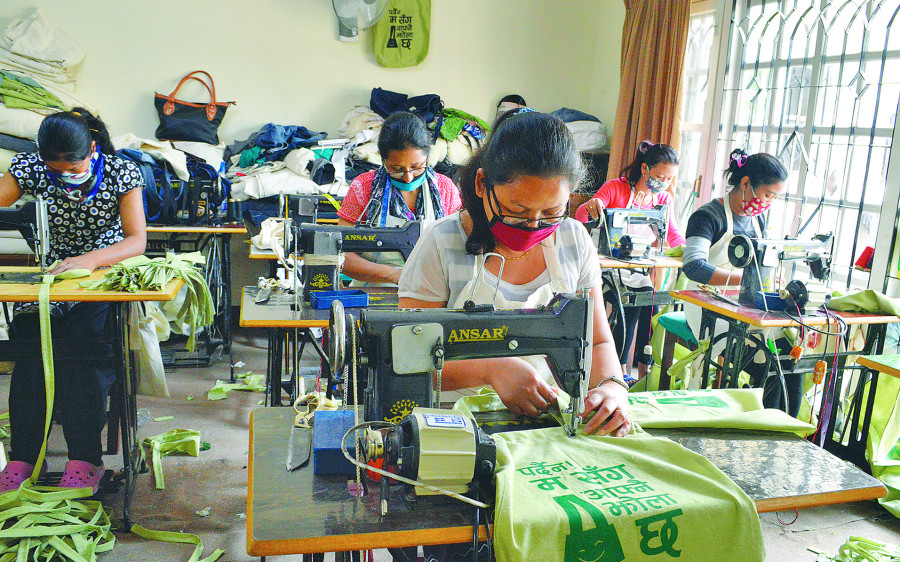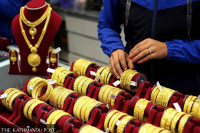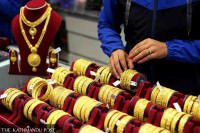Money
Women entrepreneurs struggle to recover from Covid-19 downturn
Around 15 percent of women-run businesses collapsed while others are operating only partially, insiders say.
Krishana Prasain
Sanu Bhattarai of Thankot was forced to shut down her small tailoring shop last Dashain, ironically in the midst of what would have been the peak season as this is when many Nepalis traditionally buy new clothes.
Misfortune struck the dressmaker as Covid-19 kept away potential customers, and she received no new orders.
Bhattarai had set up shop just a few months before the first coronavirus case was detected in China in December 2019. The first case in Nepal was confirmed the following January.
Since the coronavirus outbreak and consequent lockdown, the 37-year-old mother of two children is still struggling to get her business back on track.
“I have become unable to pay the rent for the shop. As my business remained shuttered, I cannot repay my bank loans which I had taken for start-up capital in 2019,” Bhattarai told the Post.
She is now searching for a new job to supplement her husband's income who is a taxi driver. “But it’s not easy.”
According to Reeta Simha, president of the Federation of Women Entrepreneurs Association of Nepal, around 15 percent of businesses run by women entrepreneurs collapsed while others are operating only partially since the pandemic.
The businesses that folded are mainly in the tourism sector like handicrafts, which suffered severely as tourist arrivals have not improved.
Problems ranging from managing cash, buying raw materials, paying workers, paying rent and other expenses and repaying loans to lack of demand in the market have caused immense distress to women, ultimately forcing them to leave their entrepreneurship,” said Simha.
According to Women, Business and the Law 2021, a report launched recently by the World Bank, Covid-19 has directly and disproportionately jeopardised women’s social and economic capabilities.
“Because they make up the majority of health, social service, and unpaid care workers, women are uniquely susceptible to the effects of the pandemic. In addition, women continue to earn less than men for the same work, as well as face a higher risk of violence in their homes,” the report said.
Sharada Rijal, immediate past president of the federation, said that 2020 was a tough year for women entrepreneurs; but the situation does not seem to be improving this year either.
“With less demand for goods from the international market, even I had to lay off workers,” said Rijal, who runs a handicraft export business. “The government failed to introduce relief packages and programmes for small and medium women entrepreneurs.”
A follow-up survey on the impact of Covid-19 on the Nepali economy conducted by Nepal Rastra Bank said that only 46.56 percent of small and cottage enterprises had resumed operations as of mid-November 2020, while 16.79 percent of them had been closed down. The remaining 36.64 percent of the enterprises have resumed partial operation.
The report said that only 51.55 percent of micro enterprises had resumed operations as of mid-November.
According to the Federation of Women Entrepreneurs Association of Nepal, there were 5,000 businesses operated by women entrepreneurs providing 50,000 jobs before the pandemic. Similarly, there were 500,000 self-employed women entrepreneurs in different occupations and services across the country.
“We don’t have precise data on how many women have been forced to quit their jobs after the pandemic, and we are doing a survey on it,” said Simha.
The central bank has introduced a policy to provide subsidised loans to entrepreneurs under which women entrepreneurs are provided with loans of up to Rs1.5 million without collateral.
“But our estimate shows women are not interested in the subsidised loans. We are also doing a study on what is preventing women entrepreneurs from getting credit,” Simha added.
But as per the central bank, lending to women has been increasing at a faster rate.
Speaking at a webinar titled ‘Towards recovery: Women entrepreneurs coping with the pandemic’ organised by South Asia Watch on Trade, Economics and Environment last week, Gunakar Bhatta, executive director of Nepal Rastra Bank, lending to women entrepreneurs had reached Rs4 billion as of mid-July 2020 which swelled to Rs27 billion within a seven-month period.
He also pointed out that the number of female borrowers had also increased three-fold during the period.
At the same event, Chandni Joshi, senior gender, rights and policy specialist, highlighted the difficulty experienced by women entrepreneurs in accessing finance.
“Investing in women should not be considered charity but a smart decision,” Joshi said, urging the private sector to invest in women-owned or women-led businesses as viable business decisions.
Many countries have reformed their laws in order to include women in businesses and entrepreneurship.
The World Bank’s latest report shows that under the entrepreneurship indicator, five economies have enacted separate reforms since 2019.
Pakistan allowed women to register a business in the same way as men. Bahrain and Jordan, through their central banks’ regulatory powers, introduced the right to non-discrimination based on gender in access to finance.
To comply with Bahrain’s central bank directive, banks and financial institutions must ensure that all regulated financial services are provided without discrimination based on sex, according to the report.
Because central bank directives are not always publicly accessible or widely disseminated, the United Arab Emirates, where a similar provision was introduced in 2019, launched a dissemination campaign to raise awareness among citizens.
The authorities also issued a message announcing adoption of the provision, in English and Arabic, on all ATM screens in the country.
The Marshall Islands and Uzbekistan introduced rights to non-discrimination in access to finance through broader legislation that also guaranteed gender equality. The Marshall Islands’ Gender Equality Act of 2019 provides that women are entitled to access loans, grants, mortgages, credit, or any other financial service on an equal basis with men.
Similarly, Uzbekistan’s Law on the Guarantees of Equal Rights and Opportunities for Men and Women of 2019 prescribes non-discrimination in the provision of movable and immovable property, land, financial assets and loans.
“Despite these reforms, 108 economies still lack legal provisions that expressly prohibit gender-based discrimination in access to finance. For women who become entrepreneurs, access to finance is likely necessary. The women worldwide still earn, own, and learn less than their husbands and brothers,” said the World Bank report.
A separate World Bank report says that in Nepal, many businesses are registered in the name of women specifically to secure government subsidies given to them. According to the National Economic Census 2019, women-owned firms make up around 30 percent of the total.
As Nepal’s banks still rely on collateral-based loans, there is no equity-based financing, the report said. “Since women do not hold properties, they are unable to access loans from banks and financial institutions,” the multilateral funding agency said.




 11.23°C Kathmandu
11.23°C Kathmandu















